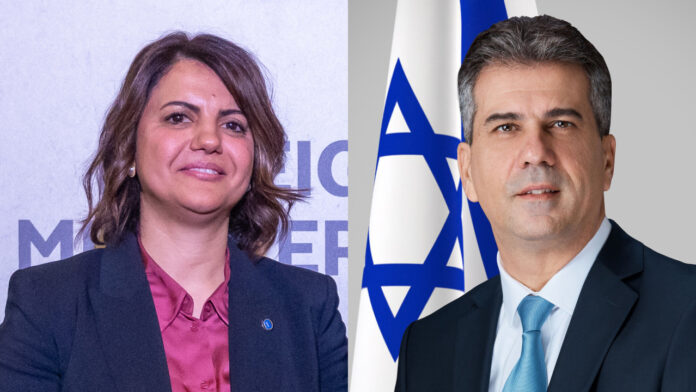In a move that will lead to speculation about another Muslim country normalising relations with Israel, the Israeli Foreign Minister Eli Cohen said he met with his Libyan counterpart, Najla Al-Mangoush, in Rome last week.
In a statement issued by the Israeli Foreign Ministry, Cohen described the meeting as “historic” and the first between Libyan and Israeli officials at such a high level.
He said the meeting aimed at “examining possibilities for cooperation and relations between the countries and the preservation of the heritage of Libyan Jewry.”
The top Israeli diplomat said the meeting with the Libyan Foreign Minister “is the first step in the relationship between Israel and Libya.”
“The size and strategic location of Libya give ties with it enormous importance and enormous potential for the State of Israel,” Cohen added.
The Israeli minister said he discussed with Al-Mangoush “the great potential for the two countries from their relations, as well as the importance of preserving the heritage of Libyan Jewry, which includes renovating synagogues and Jewish cemeteries in the country.”
The first-ever meeting between the Israeli and Libyan foreign ministers was arranged by their Italian counterpart Antonio Taiani.
Subscribe to our newsletter and stay updated on the latest news and updates from around the Muslim world!
“We are working with a series of countries in the Middle East, Africa and Asia with the aim of expanding the circle of peace and normalisation of Israel,” Cohen said.
There is no comment yet from the Libyan authorities on the Israeli minister’s statements.
But in 2021 Libya’s ruling presidential council suspended Foreign Minister Najla Al-Mangoush for “administrative violations” and barred her from travelling. A spokeswoman for the council said the three-member body suspended Al-Mangoush for carrying out foreign policy without coordination with the council.
Al-Mangoush represents the Government of National Unity which is recognised as the legitimate government by the United Nations and is based in Tripoli. It has international support from various countries, including Turkey and Qatar.
However, the Libyan National Army, led by General Khalifa Haftar, controls a significant portion of eastern Libya and is backed by several countries, including Egypt, the United Arab Emirates (UAE) and Russia.
Libya does not have diplomatic relations with Israel, although currently six Arab countries have diplomatic ties with Israel starting with Egypt in 1979, Jordan in 1994, and the United Arab Emirates (UAE), Bahrain, Sudan and Morocco in 2020.
The history of Libya-Israel relations has been marked by tension and conflict. Libya historically supported the Palestinian cause and opposed the existence of Israel.
The signing of the Oslo Accords in the 1990s led to some improvements in relations in the region, but Libya’s stance remained largely unchanged.
UPDATE: August 28, 12.30pm
Protesters gathered in Libya’s capital Tripoli last night to voice their anger against Foreign Minister’ Najla Al-Mangoush’s meeting with her Israeli counterpart Eli Cohen in Rome recently. Waving Palestinian flags and chanting slogans, they urged the government to bring the foreign minister to account. Similar protests were held in other cities across the country.
Prime Minister Abdel Hamid Dbeibeh has now suspended Al-Mangoush. A decree by the Government of National Unity said: “It was decided to suspend Libyan Foreign Minister Najla al-Mangoush and to launch an investigation against her.”























